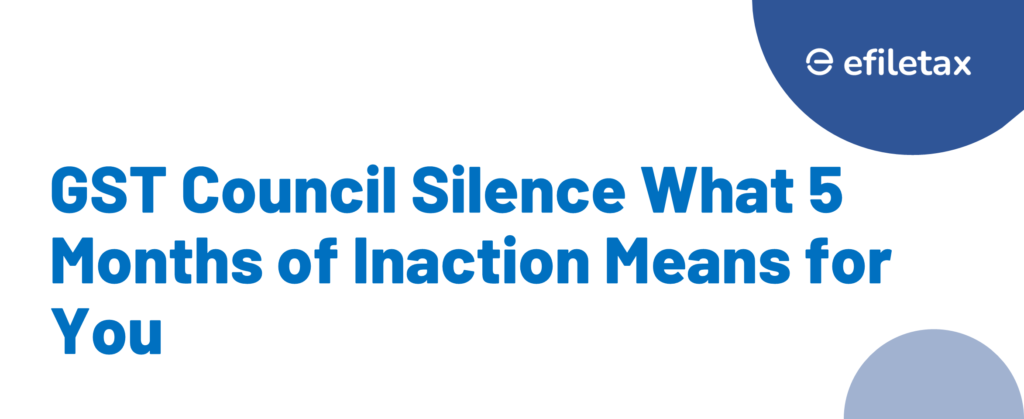
Introduction:
GST Council meeting delay has left major tax reforms hanging. With no meetings held in the past five months, businesses and consultants are raising concerns over stagnation in decision-making, rate rationalisation, and clarification on pending issues.
Let’s break down what this delay means for Indian taxpayers and why it matters now more than ever.
What is the GST Council and Why Its Meetings Matter
The GST Council, set up under Article 279A of the Constitution, is the apex body responsible for decision-making on all GST-related matters—rates, exemptions, procedural rules, and systemic reforms.
Key roles of the Council:
- Revising GST rates (goods and services)
- Deciding compliance deadlines and returns
- Approving amnesty schemes and dispute resolution frameworks
- Setting up appellate authorities like the GSTAT
📌 Latest meeting held: December 2023
📌 Next meeting due: Still pending as of May 2025
Reforms Awaiting GST Council Nod
1. Rate Rationalisation
The much-needed merger of the 12% and 18% slabs is still pending. This reform aims to simplify the tax structure and reduce classification disputes.
2. GSTAT Implementation
Although the GST Appellate Tribunal (GSTAT) has been notified, actual panel formation and regional benches require Council clearance and coordination with states.
3. Input Tax Credit (ITC) Clarity
Pending clarifications on:
- ITC on CSR expenses (under litigation)
- ITC reversal timelines under Rule 37A
- Refund norms for inverted duty structure
4. Sector-Specific Issues
- GST on gaming & online casinos (awaiting final decision post-SC guidance in Gameskraft case)
- Clarifications on GST applicability for co-operative housing societies and restaurants in luxury hotels
Why the Delay?
As per sources from the Department of Revenue, differences between Centre and States over revenue shortfalls, compensation mechanisms, and political scheduling have contributed to the delay.
Without a Council meet, pending notifications and circulars remain unissued—hampering compliance clarity.
Impact on Businesses and Consultants
| Stakeholder | Impact |
|---|---|
| Small Businesses | Delay in relief measures like GST Amnesty extension |
| Tax Consultants | Lack of clarity on return filing changes and ITC claims |
| Large Corporates | No movement on rate rationalisation, impacting pricing decisions |
| Startups | Uncertainty around online gaming tax regime and TCS implications |
Legal References & Background
- Constitution Article 279A: Empowers GST Council
- Latest GST Council Press Release: Dated 22 December 2023
- GSTAT Notification: Notification No. 01/2024-GST dated 01.01.2024
- SC Case: Union of India v. Gameskraft Technologies Pvt Ltd – taxability of online games pending final order
Expert View
CA Priya Deshmukh, Indirect Tax Advisor:
“This delay breaks the expected rhythm of quarterly GST Council reviews. Businesses suffer when compliance remains a moving target without official updates.”
What Can Taxpayers Do Now?
Until the next GST Council meeting is convened, businesses and consultants should:
- Rely only on official CBIC circulars and FAQs
- Keep documentation ready in anticipation of future reforms
- Follow high court or Supreme Court rulings where clarifications are lacking
- Watch for state-wise circulars in absence of national guidance
Conclusion
The GST Council meeting delay is more than a bureaucratic issue—it’s stalling critical tax reforms that affect every corner of India’s economy. At Efiletax, we track every official update to keep you informed and compliant.
🔗 Need help navigating GST compliance? Connect with Efiletax experts now
FAQ
Q1. When was the last GST Council meeting held?
December 2023.
Q2. Why is the delay in GST Council meetings a problem?
It halts rate updates, clarifications, and legal implementations like the GST Appellate Tribunal.
Q3. Can taxpayers take any action while waiting?
Yes. Maintain compliance based on the last valid circulars and stay alert for High Court or CBIC updates.
Summary
The five-month delay in the GST Council meeting has stalled key reforms like rate rationalisation, GSTAT formation, and ITC clarifications. Businesses and tax professionals await clarity as compliance hangs in the balance.